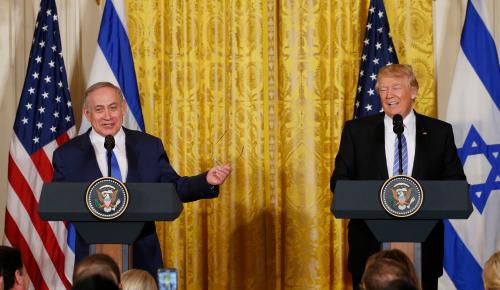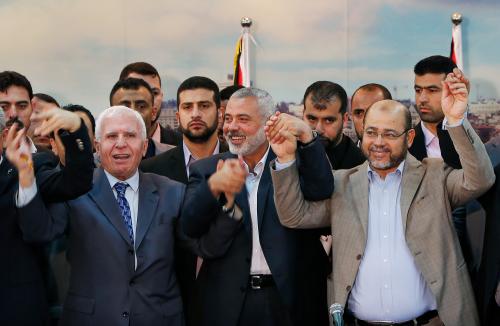At last weekend’s Saban Forum—an annual collaboration of the Brookings Institution and Brookings trustee Haim Saban—national security officials and politicians left, right, and center, gathered at the Willard Hotel in Washington to assess the state of U.S.-Israel relations and the wider Middle East in the age of Trump. Most of the discussions are under Chatham House rule, but on the sidelines, unsurprisingly, conversations covered the range of events reshaping the Middle East today—from the drama in Saudi Arabia, to Russia’s renewed role in the geopolitics of the region, to the ever-present questions of U.S. and Israeli domestic politics and the ways they shape the relationship. High on the minds of many Israelis these days is what comes next in Syria, including the future U.S. role there.
Also clear is that while the Israeli-Palestinian peace process is no longer the center of Middle East affairs as it once was, the Palestinian cause remains a focal point of Arab politics. The leaders of the region have more pressing security challenges, emanating from Iran and extremists, but in popular sentiment the Palestinian issue still looms large.
Enter Jared Kushner and President Trump’s wading into the mire of the Middle East peace process. Senior Advisor to the President Kushner gave his first on-the-record appearance at the Forum, interviewed by Haim Saban, about the state of the peace effort. Kushner repeatedly stressed the importance his team places on not having leaks and building confidence and trust among the parties by ensuring that ideas shared with them aren’t released into the press or public discussion inadvertently. And Kushner was as good as his word, saying little about the substance of the peace negotiations he is leading on behalf of his father-in-law. Many in the media complained that Kushner gave away very little in his interview.
In fact, Kushner said one very important and somewhat controversial thing: that bottom up, confidence building measures can’t work in the absence of agreement on final status issues. That flies in the face of conventional American wisdom, which holds that in the absence of trust between Palestinian Authority President Mahmoud Abbas (also known as Abu Mazen) and Israeli Prime Minister Benjamin Netanyahu, there is no prospect of a peace agreement. Hence, better to start small, focus on confidence building, on building the capacity of the Palestinian Authority, fostering economic ties between the parties, and generally laying the groundwork for greater capacity on the Palestinian side, and great trust between the parties. Only then can final status negotiations advance.
Kushner explicitly rejected this logic. He noted that this is the approach that had been taken for many years now, and far from building trust, trust had eroded. He asserted that the small bore problems that so occupy today’s Israeli-Palestinian politics could only be solved if there was clarity about final status.
In the absence of a political horizon, people make decisions based on who’s holding the guns now.
I believe he’s right. More than a decade ago I worked for two years at the U.N. negotiation mission in Jerusalem and Gaza, shuttling between the Israeli and Palestinian leadership. At the time, talking to both Israeli and Palestinian counterparts, I reached the conclusion that neither country could take the steps necessary to move past hostility without much greater clarity about where they were going. The reason is simple: People are genuinely reluctant to take risks, make investments, or build relationships without having some sense of certainty about the direction in which their situation is heading. I saw this at play in Afghanistan too, later in the decade: Local Afghans making decisions about whether to align themselves with or against the Taliban needed some sense of certainty about who would hold power down the road. It’s a lesson that holds across civil wars and related conflicts: In the absence of a political horizon, people make decisions based on who’s holding the guns now. That’s a recipe for continued violence and distrust, not for breaking the cycle.
Secretary Kerry understood this and made a brave attempt at peace in the last years of the Obama administration. But trying to negotiate a peace at the tail end of a president’s administration is fraught, and Kerry had to deal with the perception that Obama wasn’t fully behind him, and with a terrible relationship between Netanyahu and Obama. Kushner, by contrast, has an unquestioned support of the president, an early start, and the advantage of trust (or at least good relations) between Netanyahu and Trump. None of this makes Kushner’s job easy, and the trials and tribulations of the broader Trump White House may still foil his efforts. His instinct, though, to focus on the big picture is right, conventional wisdom be damned.







Commentary
What Jared Kushner gets right about Middle East peace
December 5, 2017